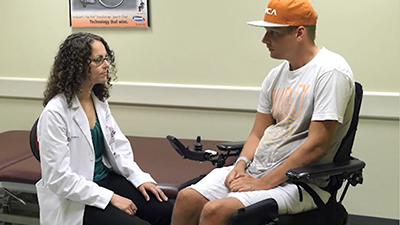
COMPETENCIES PROMISE TO REDUCE HEALTH CARE DISPARITIES FOR MILLIONS OF AMERICANS WITH DISABILITIES
12/15/2020

|
Consensus was reached on the Core Competencies on Disability for Health Care Education through a partnership with The Ohio State University Nisonger Center and the Alliance for Disability in Health Care Education. The Competencies are designed to improve training across a diverse field of medical providers and improve the care received by people with disabilities throughout the health care system. Although access to care is improving in the United States, the growing population of patients with disabilities still face barriers to care at multiple levels in the health care system. Most students in health professional programs report no clinical training and report discomfort with patients with disabilities. Lack of training and bias contribute to heath care inequities for patients with disabilities and complex care needs. "These competencies will provide a framework for educators to help them better prepare future doctors, nurses and other health professionals to provide quality care to people with disabilities," said Dr. Linda Long-Bellil, President of the Alliance for Disability in Health Care Education. Over 150 people with disabilities, disability advocates and professionals, and health educators from diverse disciplines developed educational standards of quality care for people with disabilities. Methodology for gaining consensus between these stakeholders is outlined in the attached article, What should we teach about disability? National consensus on disability competencies for health care education. The standards, Core Competencies on Disability for Health Care Education, are the first interprofessional competencies to address health care needs of patients across a broad range of disability. "Health care providers are committed to providing quality care to their patients, but are often unprepared to address the needs of patients with disabilities," said Dr. Susan M. Havercamp, Director of the Ohio Disability and Health Program at The Ohio State University Nisonger Center, who led the competency effort. "Creating educational standards on disability is important because it will give students the opportunity to learn about disability as part of their professional training program."
The Core Competencies on Disability for Health Care Education is gaining support among local and national disability and health professional organizations with endorsements from American Academy of Developmental Medicine and Dentistry, American Association on Health and Disability, American Association on Intellectual and Developmental Disabilities, Association of University Centers on Disabilities, Autism Speaks, Accreditation Council for Education in Nutrition and Dietetics, Coalition for Disability Health Equity, Developmental Disabilities Nursing Association, Goodwill Columbus, NADD, National Association of Chronic Disease Directors, National League for Nursing, National Association of County and City Health Officials, American Speech-Language-Hearing Association, National Organization of Nurses with Disabilities, New York Association on Independent Living, and UAB Lakeshore Research Collaborative, among others. Havercamp, S. M., Barnhart, W. R., Robinson, A. C., & Whalen Smith, C. N. (2020). What should we teach about disability? National consensus on disability competencies for health care education. Disability and Health Journal, 100989. https://doi.org/10.1016/j.dhjo.2020.100989 To access a copy of the Core Disability Competencies, please visit http://go.osu.edu/disabilitycompetencies